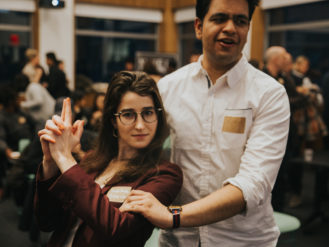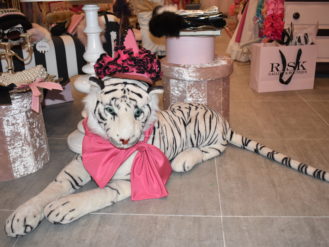This Pot-friendly Startup Has a Brand Name You Won’t Forget
PussyWeed, an apparel-and-accessories business, is out to make a point about the gender gap in the cannabis space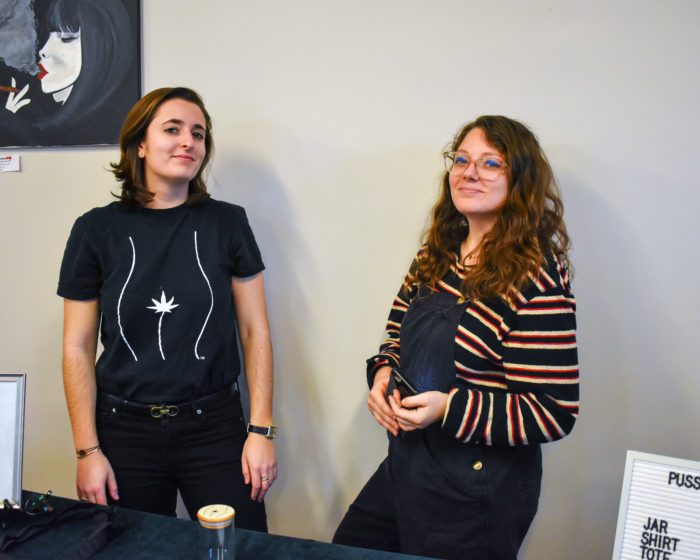
Two of the company's three co-founders, Ava Kingsley (left) and Hannah Campbell, selling their products at a pop-up store (Photos courtesy of PussyWeed)
In the summer of 2016, months before Donald Trump’s “grab them by the pussy” recording emerged and “pussy hats” became the accouterment of choice for participants in the Women’s March, a trio of young female entrepreneurs launched a campaign to reclaim the p-word. College students at the time, the three were also marijuana enthusiasts, which inspired them to invent a two-faceted brand, PussyWeed, an apparel-and-accessories company with the mission to better the social standing of both words.
“Our reaction to [the Trump tape] was, ‘This proves our point exactly,’” says PussyWeed co-founder Ava Kingsley, a Park Slope native. “If we force people to say the word ‘pussy’ in a positive context, and it makes them think of their use of the word, then we’re doing our job.”
On the PussyWeed site, shoppers can buy t-shirts, tote bags, pot grinders, stash jars, ashtrays and stickers. Manufactured by small-business owners like themselves, the items are emblazoned with the PussyWeed logo: an outline of a woman’s lower midsection with a pot leaf strategically placed for a smoky double-entendre. By design, the artwork is as risqué as the company moniker. “We have a very provocative name; the logo is very endearing,” Natasha Przedborski, a second co-founder, says. “But we’re dealing with something that’s very serious.”
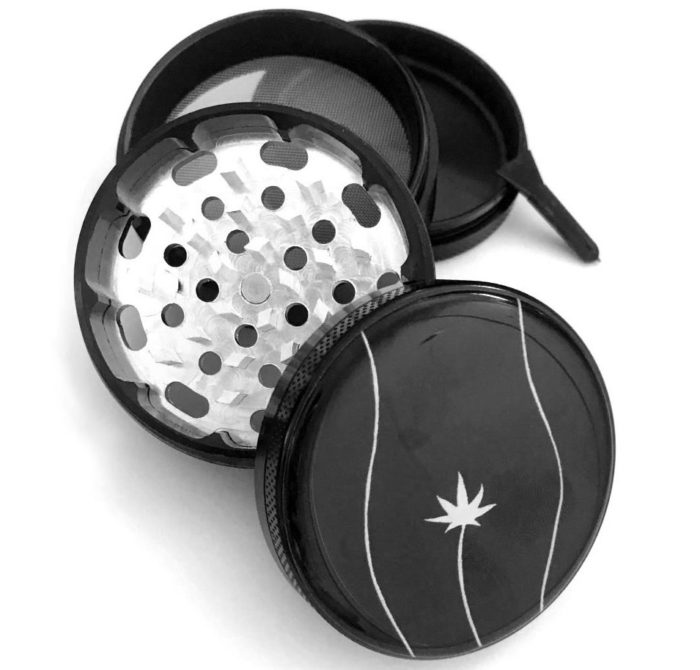
The grinder, used for chopping up marijuana buds, became a hit product
The path toward PussyWeed’s launch began a couple years ago when Kingsley befriended Przedborski, an Upper West Sider, when they were enrolled at Barnard College. They bonded over their appreciation of pot and decided to become roommates. One night, another female friend of Przedborski texted her, “Do you know where I can buy weed? I’m afraid of my dealer.”
Przedborski was angry on behalf of her friend and realized that, historically, she too rarely had personal access to cannabis. “I never really drank, but I smoked as a teenager, and I was always with a group of boys,” Przedborski recalls. She says she initially embraced her identity as “the chill girl who hangs out with boys,” enjoying the pot provided by them. But after fielding that text, Przedborski, who says she smokes marijuana for recreation and to treat migraines, vented her anger to Kingsley.
“Often, dealers are men and there’s a power imbalance,” says Przedborski, adding that women pot smokers frequently find themselves in a stranger’s home or car when trying to buy. “You’re automatically commodified as a woman … We hated that position and wanted other women to know that they’re not alone.” The problem persists in places where pot is still illegal; New York State has approved marijuana sales for medical purposes but not recreational use.
Przedborski and Kingsley decided to create an organization that would raise awareness of the issue, coming up with the name so swiftly they can hardly recall how it was hatched, though they fell in love with it immediately. They discussed the emerging advocacy group with friends, including Hannah Campbell, who was living in Bushwick while studying at New York University, and had uncomfortable experiences of her own with male pot dealers. (She says one evening, when hanging out with two girlfriends at one of their homes, a dealer showed up with another guy. After the transaction was over, the men just settled in and made themselves comfortable, packing a bowl. After some tense moments, they were asked to leave and did so without incident.)
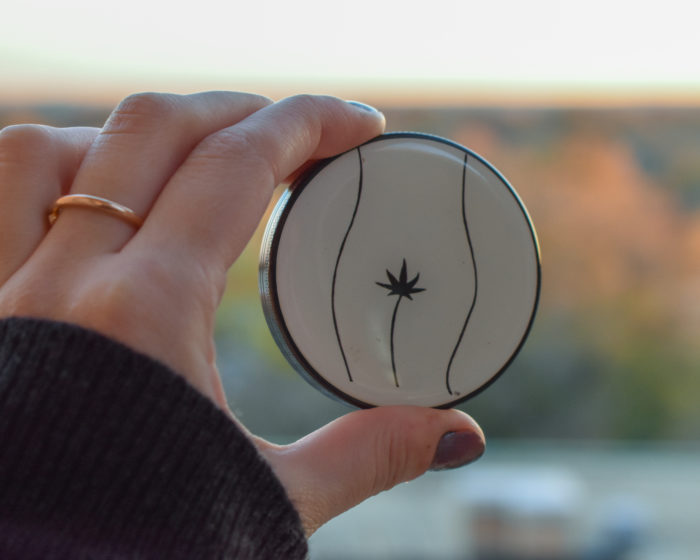
The lid of the company’s stash jar, because who wants to store their weed in a Ziploc bag?
Campbell is the one responsible for the logo. “While the designs might be a tad risqué, you can always tell your grandma that the ‘maple leaves’ are floating on a river, or that a ‘palm tree’ is stuck between two squiggly walls,” wrote their campus newspaper in a profile of the venture.
Instead of ordering just a handful of t-shirts for themselves and friends, the women saw the more favorable bulk pricing on a manufacturer’s site, and opted to order 50 white-on-black tops. Their social circle claimed them all within a few days, many of them through purchase orders via a link posted online. The three friends knew they’d tapped into some high-minded magic, and ordered more shirts.
Even while immersed in final-year undergrad studies, the PussyWeed founders expanded their operation, sometimes serendipitously. “The grinder was a surprise birthday gift for Hannah,” Przedborski reveals. “Ava and I decided we have to get her something PussyWeed-customized.” They happened upon a grinder manufacturer, and ordered a bunch at a discount rate. “It was like, ‘All right, I guess we’re selling grinders now.’” (They do not, of course, sell pot, but the trio told The Her(B) Life website, “You can expect a PussyWeed strain the day recreational use is legalized in New York City.”)
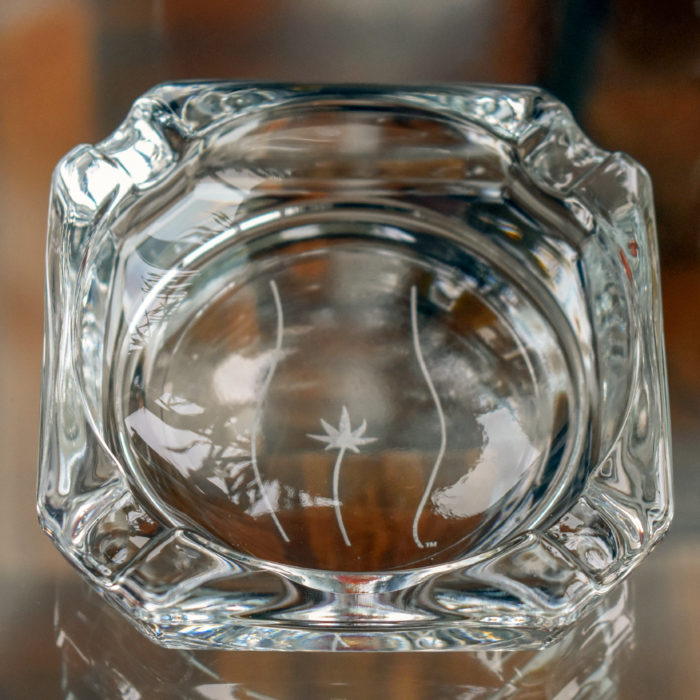
A risqué ashtray makes for a more interesting coffee table
The grinders were a hit and they soon began offering additional items, constantly reinvesting in merchandise and the development of their website. Surprisingly, given their age, the founders say they’re personally “not really into social media,” but got in the swing of it for the sake of their business. They’re up to nearly 15,000 followers on Instagram. Kingsley and Przedborski attended the Women’s March too, wearing shirts and carrying signs that spurred conversation.
As their company has grown, so has their message. Today, PussyWeed’s founders also want people to understand that women who are into weed shouldn’t be constantly sexualized, as they are in the overwhelming majority of social-media posts where women and weed show up together. “Every time there’s a music video where a blunt’s passed, it’s a woman in a bikini,” Przedborski adds. “We wanted to bring a different voice to cannabis, and try and reach a more inclusive community.”
The founders object as well to the disproportionate numbers of arrests of people of color for possession of pot, in spite of recent de-criminalization laws in New York City. (In 2016, 86% of city pot arrests were of black and Latino people.) They also want to promote cannabis wellness, while lashing out against the use of “pussy” as a derogatory term for a person who appears effeminate in some way.
All three of the founders graduated from college last spring. They each have day jobs now, but hope 2018 is the year they can begin to pay themselves a bit for their labor. “There’s more than enough work to do,” says Campbell. Though they’ve formally been selling products for only about 15 months–online and at pop-up locations–Kingsley says PussyWeed is profitable, shipping across the U.S. and internationally. However, all the money they make from their merchandise goes right back into the company, which to them is still a thing of unknown potential.
“I think we’re still figuring out who we are,” Campbell says. A podcast is in the works. Przedborski describes the multi-floored PussyWeed office of their dreams, complete with a recording studio, library, community space, and cannabis education classes.
“If cannabis is legalized in New York State,” says Kingsley, “there’s nothing that would make me happier than to have a beautiful PussyWeed coffee shop.”





